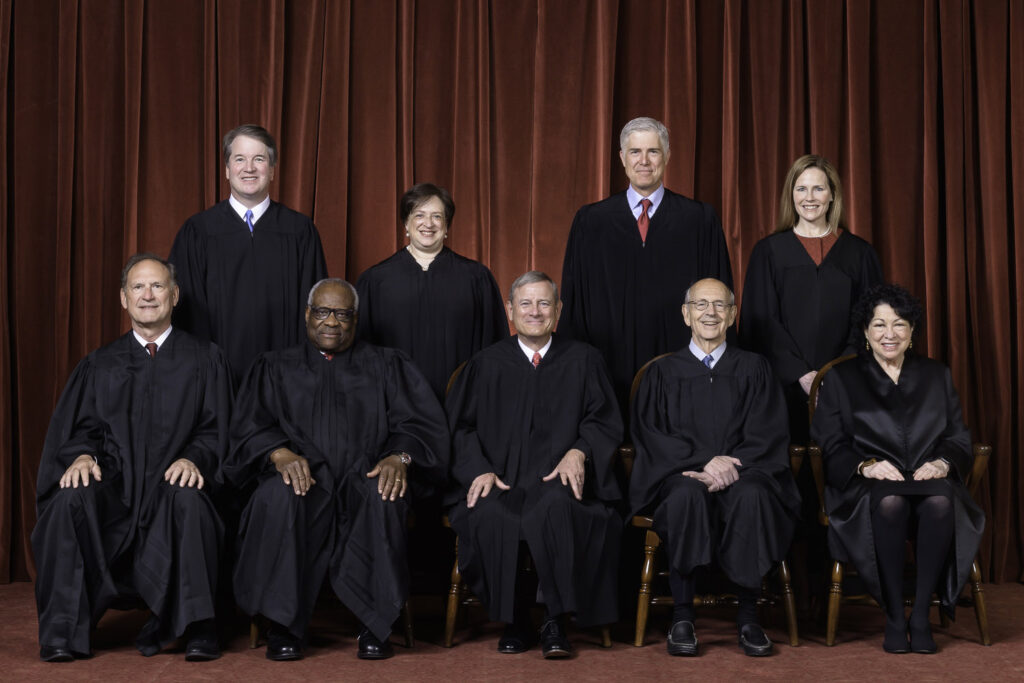Back to SCOTUS Reform and “Legitimacy”
Doing nothing is still a choice, and the legitimacy crisis is here, like it or not.

Earlier this week, the commission appointed by Biden to explore Supreme Court reform options issued a preliminary report as per CNN: White House’s Supreme Court commission releases draft materials punting on court packing, but appears to favor term limits for justices. Dahlia Lithwick and Mark Joseph Stern, writing for Slate have an analysis of this outcome: Biden’s Supreme Court Commission Walked Straight Into the Legitimacy Trap
The Supreme Court is struggling with a “legitimacy crisis.” According to the polls, Americans have lost confidence in the branch that requires public confidence to exercise power. Several of the justices see the legitimacy of the court as an existential matter that demands blame-shifting. According to Justice Samuel Alito, the media and liberal law professors are responsible. According to Justice Clarence Thomas, the press are wholly to blame. According to Justice Amy Coney Barrett, the partisan press is culpable. And according to Justice Stephen Breyer, partisan politics itself is to blame. It should surprise nobody, then, that according to the draft report issued by 36-ish members (at least one has resigned) of President Joe Biden’s blue-ribbon commission to evaluate the court, absolutely nobody is to blame.
Well, you know if nobody is to blame, it means that doing nothing is the best route.
On Thursday, the commission released 200 pages of “Discussion Materials” that represent a tranche of legal research, committee impressions, and policy placeholders. After six months of gathering facts and evidence, taking testimony, and mulling reform ideas, the commission declares that it is neither offering recommendations about fixing the courts nor proposing a specific path forward. One problem: In so doing, the commission is actually proposing a specific path forward—the one we are already on. The commission seems to frame the status quo as the reasonable choice and all alternatives as dangerous deviations.
It is important to underscore the recommending no changes is a choice and should not be treated as anything other than such (acknowledging, of course, that it is the easiest choice and will be perceived by many as simply respecting our institutions).
This underscores, I would argue, the small-c conservative nature of our politics, especially when it comes to any conversation about reform (large or small). We get so caught up in a combination of reverence for the past and concerns about unintended consequences (two key features of a small-c conservative mindset) that we refuse to do anything. And, hence, the status quo remains in place. That is great if the status quo is functioning adequately, but it isn’t.
To wit, and to repeat a fact that I have noted multiple times: the current Court unfairly represents minority interests in the country due to profound flaws in our governing institutions. Its 6-3 conservative majority is straight-up the result of minority rule.
Yet,
the commission’s draft starts and ends with the proposition that preserving the court’s public legitimacy is the only goal. By definition, any course of action disrupts that. By definition then, shoring up public confidence requires blinkering oneself to a decadeslong program of capturing the court for conservatives who were unable to capture governing majorities.
To update a list from a previous post (A Defense of Expanding the US Supreme Court):
Since 2000 (recognizing that the current presidential term is incomplete):
- Six presidential terms
- Three terms for Republicans (Bush x2, Trump)
- Three terms for Democrats (Obama x2, Biden)
- One popular vote win by Republicans (2004)
- Five popular vote wins by Democrats (2000, 2008, 2012, 2016, 2020)
- Five Supreme Court Justices appointed by presidents who initially came to office (Bush had not appointees in his first term) after having lost the popular vote (Roberts, Alito, Gorsuch, Kavanaugh, Barrett).
- Three Supreme Court Justices appointed by a one-term president who lost the popular vote by almost three million votes (Gorsuch, Kavanaugh, Barrett)
Allow me to emphasize: five popular vote wins for Democrats, but five Supreme Court nominations by Republicans. (And don’t forget the Senates that confirmed those GOP-nominated Justices represented a minority of the population).
Further, the system we currently use to appoint Justices is not systematic and is predicated entirely on either the uncertainly of death or the choices of an individual Justice.
All of this means that maintaining the status quo and pretending like we have a well-oiled constitutional machine in place that promotes legitimacy is a flawed premise, even if it is an easy choice to make.
Indeed, Gallup tells us (from September of 2021): Approval of U.S. Supreme Court Down to 40%, a New Low.
As Lithwick and Stern note:
shoring up public confidence requires blinkering oneself to a decadeslong program of capturing the court for conservatives who were unable to capture governing majorities. That story is well-known. Sen. Mitch McConnell boasts about it. Donald Trump never tires of bragging about it. Nobody disputes that this was the conservative legal movement’s strategy or that they succeeded.
But that isn’t the story the commission wants to tell. Instead, the commissioners offered a passive narrative about politics and polarization and mutual mistrust. To be sure, it’s a good, neutral, elevated story rooted in the insistence that everyone is equally at fault. But the consequences of this studied neutrality—this choice to contend that the crisis at hand is one of judicial legitimacy, as opposed to the deliberate subversion of judicial legitimacy and democratic norms—is anything but neutral.
Let me be clear: despite what one may think of McConnell and his Republican allies, they achieved their goals via constitutionally legitimate (and I use that word pointedly here) means. But, to return to what I noted above about the last two decades of American politics, they achieved those ends with a stacked deck. To mix metaphors, the playing field is not level, nor will it naturally level itself.
That is not a recipe for fixing the Court’s legitimacy problem.
But the Commission is ignoring this.
The most important section, on court expansion, is also the most craven and misleading. Democrats should get over it and move on, the committee suggests, for the good of the country: “The risks of court expansion are considerable,” it warns, “including that it could undermine the very goal of some of its proponents of restoring the court’s legitimacy. Recent polls suggest that a majority of the public does not support court expansion. And as even some supporters of court expansion acknowledged during the commission’s public hearings, the reform—at least if it were done in the near term and all at once—would be perceived by many as a partisan maneuver.”
[…]
Incredibly, the commission is even dubious about statutory term limits for justices, an extremely popular proposal with bipartisan support. Some members, to be sure, support these limits. But others oppose them, fearing they will “generate greater uncertainty and mistrust” while undermining “the court’s legitimacy, or perceptions of its legitimacy.” As Sen noted, this sour language throws cold water on the momentum for term limits. Because ultimately concerns for “legitimacy”—not empirical measurements of it, or scrutiny for where it was lost, but free-floating, abstract institutional feelings-ball—trumps placing even modest limits on our philosopher kings.
Look, “legitimacy” as a concept is a slippery one. It can mean that an action or behavior is within the norms of society, or done via established, legal means. It really means, in basic terms, broad social acceptance, especially as being used here. But as I note above (and as the Commission seems to acknowledge) SCOTUS already has a legitimacy problem and maintaining the status quo is not going to fix it, because it only going to get worse, in my view, if there is no change.
Consider the following scenario: Breyer dies in 2023 and the Republican-controlled Senate blocks Biden from replacing him and a popular-vote losing Republican appoints a 7th conservative to the bench in 2025. That scenario is not at all out of the question. That scenario is not going to lead to enhanced legitimacy for SCOTUS (it would probably lead to street protests and probably some rioting). Even the scenario wherein Roe is overturned and SCOTUS upholds a number of voting rights restrictions will have its own negative impacts on the Court’s legitimacy (and that is an almost certain scenario).
This is why the following is a problem:
The committee seems to think that an overwhelming bias toward the status quo does not count as taking sides.
It is absolutely true that the norm is to have nine Justices and that for Justices to only be added when one leaves for whatever reason. Therefore, any change to that process will be the breaking of old norms in the hopes of establishing new ones. Such shifts will, inevitably, been seen as a power move by one side at the expense of another side (and that assessment would be correct).
But, two points. First, as noted, maintaining the status quo enhances one side at the expense of the other. Second, McConnell’s move on the Garland nomination was a power move by one side at the expense of the other side (and was a violation of norms in and of itself). The notion that the status quo is somehow neutral is simply not true. (It is worth noting that Kavanaugh’s fairly blatant partisanship at this confirmation hearing was norm-breaking as well).
Yes, expanding the Court or some other set of reforms would be perceived as illegitimate by some Americans. But it needs to be understood that the status quo is not viewed as fully legitimate by another subset of Americans.
I should also note that most Americans likely have no idea how many Justices there are, why we have the number we have, or really what SCOTUS does. Google does not provide confirmation nor denial of this premise, but it does say that in 2018, 52% of Americans could not name a single Justice, according to a C-Span poll–a poll that shows partisan splits over the Court already, and as well as overwhelming support for doing away with lifetime appointments.
To the point about ongoing, eroding legitimacy in some quarters, back to the linked piece:
During the six months that this commission has been preparing its draft report, the current Supreme Court made it harder for minorities to challenge racist voter suppression laws, harder for unions to organize, and harder to learn who is contributing funds to political groups. It has changed the law of religious liberty through the shadow docket. It has also, in case you missed it, allowed approximately 10 percent of American women of childbearing age to lose their constitutional right to abortion in September.
While I am sure that a lot of Americans will just accept whatever the Court decides on whatever issue (or, more accurately, most Americans will not pay attention to most of it what the Court does). But a substantial number of people will look at the outcomes, know how the current Court was constructed, and perceive it as illegitimate.
I would note, what McConnell did after Scalia died was constitutional. But, likewise, adding members to the Court is constitutional.
Legitimacy is almost a tautological concept: an institution has it because it has it. There is no magic that can be deployed to guarantee that legitimacy is in place nor that it will be maintained. Change can diminish legitimacy and change can enhance it. The same is true of doing nothing.
We are already at the illegitimacy moment, so avoiding reform so that we avoid perceptions of illegitimacy is a moot position. We are likely just burying our heads in the sand and hoping that everything turns out fine.
Also, a comparative note that doesn’t fully fit in above:
And what about America’s role as a shining beacon on the hill? “The American example in the world matters,” the commission writes. “Some Commissioners believe that there is a real risk that the willingness of Congress to expand the size of the U.S. Supreme Court could further weaken national and international norms against tampering with independent judiciaries.” Unmentioned in this passage: No other country except India has a high court as powerful as the United States’ or allows judges to serve for life. Rather, the vast majority of peer nations strictly limit or disallow judicial review of democratically enacted legislation; and yet most Americans probably would not consider the United Kingdom or France or Israel to be the authoritarian hellscape the commission fears. Ignoring this mountain of evidence from around the world, the commission speculates that if elected representatives impose a constitutional check on nine unelected justices, they will not enhance world democracy but destroy it.
Quite frankly, we should probably change the national motto to “Ignoring Mountains of Evidence from Around the World.” Note my post on Comparative Judiciaries from 2018 that details the lack of systems that rely on the capricious choices of sitting Justices or the randomness of death to determine who sits on their constitutional courts. And while I can remember the exact powers of the Indian Supreme Court, I can confirm that the US Court is extremely powerful in comparative terms to the point of being, dare I say, exceptional, and that most countries limit the appointees to their constitutional courts either with an age limit, a fixed term, or both.






It seems to me that legitimacy is to institutions what happiness is to individuals: something everyone wants but won’t achieve if it becomes a goal in and of itself. Legitimacy is something you achieve as a side effect of doing something else like enforcing the law equitably or administering justice.
Favoring the least constitutional option is a choice, I suppose. Unless they want to limit terms with drone strikes, I don’t see how it passes the supreme court’s own review of what a “lifetime appointment” means.
Also, I would generally be opposed to drone strikes against the Supreme Court.
Not sure how I would feel about a “Logan’s Run” reboot as a reality show starring elderly justices in hiding, hearing cases over zoom, and pursued by a bunch of Sandmen wearing the uniforms from the original movie.
I mean, I would be opposed, I guess, but it would be pretty cool.
I would like a dead-man’s switch resignation-letter attached to the robes, so they can’t be taken off.
I think the legitimacy ship is boarding, if it hasn’t already sailed.
The Republican assault on the legitimacy of government in general (and the courts weird refusal to suddenly proclaim the last election fraudulent and trump the president) has hobbled it from the right, and the Garland fiasco has hobbled it on the left.
We are a few headline grabbing decisions away from the middle noticing that random unelected judges are deciding that they have no rights.
My preferred rebalancing is to just switch it to one nomination per presidential term, and worry about the single justice scenario, or the 80 justice scenario when it happens.
This is why any attempt to fix or preserve the court’s legitimacy is doomed in the same way Trump’s presidency was doomed. Americans already know the court’s composition does not reflect the will of our democratic Republic, that we got here through fundamentally unfair shenanigans.
Whatever Trump did, it was baked into the cake American voters never wanted him and would never fully accept him. So you can reform the court from now till forever, McConnell’s dirty tricks have permanently tarnished this 6-3.
That’s why Roberts is so desperate to moderate it. He knows the court is out of touch with the Constitution’s opening lines, “We the People,” and that
is the threat to the court’s legitimacy. Roberts knows there’s nothing in the Constitution itself that makes SCOTUS the final arbiter, a legacy of Marbury v Madison. So the moment Americans view this court — already perceived as illegitimate — as absurdly radical also, SCOTUS rulings will be toothless. As well as a political disaster.
A court that is too extreme can be dismissed pending self-recalibration. Roberts is trying to prevent this doomsday scenario for his legacy. Too late, maybe.
I think this part of your post is what gets to the actual problem. Given the current state of Congress, any “reforms” they might make won’t make the court more legitimate.
Fundamentally, the problem is that the courts are deciding too many issues and the importance of the courts is too great. Control of the courts is seen as essential and existential by activist partisans because the reality is the court currently has the de facto power to make or break policy. And the court is in this position not because of its own choosing and not because of, as you try to argue, structural problems with the court, but because Congress isn’t doing its job and the courts are forced to pick up the slack. Absent a competent and legitimate Congress, we have ever-growing Executive power, which increasingly acts because Congress won’t, and then the courts are put in the position of adjudicating Executive actions.
“Reforming” the court via packing, term limits or whatever means don’t solve that problem.
Moreover, court reforms, if they are to actually be legitimate, require a competent and legitimate Congress which we don’t have. So in terms of process, court reforms cannot happen absent Congressional action that is viewed as legitimate by a majority of the population. A Congress that is mired in extreme partisanship, seeks 50+1 majorities to ram through its priorities, and can’t even wipe its own ass cannot hope to “reform” the court, much less in a way that would be seen as legitimate.
In short, Congress is the root cause of the lack of legitimacy in government to include the Supreme Court. If there is a crisis of legitimacy with the courts, the cause and solution is Congress.
@Andy: I would go further and say the root cause of the legitimacy crisis is representativeness across the board, to include the problem with SCOTUS noted above.
If every institution of significance can be captured by minority interests with no incentive to compromise and therefore to govern, then we get stuck across the board. And even when majorities can win control, there are major obstacles in place for actual governing, not to mention incentives (such as via 2-year terms in the House) that limit a focus on governing (after all, it is in the interest of the out party to immediately obstruct the party in power, since elections are coming and a big chunk of that 2-year cycle is focused on everyone seeking re-election).
The deep incentives that create a strict two-party system within that broader problem of representativeness help perpetuate the problem.
Plus:
The House is too small.
House elections are largely non-competitive.
The Senate is not representative of the population’s interests.
Many Senate elections are non-competitive.
The Senate’s rules create minority vetoes and disincentivize legislation.
The EC can (and increasingly has) allowed the loser of the popular vote to win the presidency.
Primary elections diminish the ability of parties to represent coherent policies to the public (and allows capture of party labels by extremists).
And so forth and so on.
But for what is it worth, if I could fix one thing, I would fix Congress (quite frankly, if I could just wave a magic wand I would put in place a parliamentary system with PR elections to select the House and limit the powers of the Senate–largely the German model).
But none of the above means we can’t talk about fixing the Court (or other less dramatic fixes).
@Andy: But to be clear: I agree that Congress ought to be the focus of governing and the inability of Congress to fulfill its duties increases the power of the executive and the courts in ways that are not desirable.
I do think that things could be done to improve the performance of Congress, but that a lot of what we are seeing is inherent to separation of powers systems (it is what Juan Linz warned about decades ago writing about Latin America–presidentialism tends to do what you are describing).
I think what a lot of people still do not fully appreciate is that our system worked better prior to post-1994 era because the Democratic Party was a large coalition of libs and cons who structurally found themselves working together in a way that is not possible now because the parties have sorted.
@Steven L. Taylor:
Alas, no one has a magic wand. There aren’t even any politically feasible paths to the solutions for the Legislature you’ve suggested.
The country is past any turning point. We just don’t know it yet. It’s going to have to get uglier before it gets better. If January 6th can be dismissed, something worse will be needed for people to start to accept change is needed.
@Scott F.: No magic wand, indeed.
In my more optimistic moments, I assume that we just limp along with this mess.
In my more pessimistic ones, I fear that we are headed from some serious crisis that leads to at least a semi-collapse of the system.
@Steven L. Taylor:
It’s possible that crisis doesn’t come from within. The longer this continues, the more likely it becomes an international alternative presents itself.
I’m unsure of the details, but I recall reading something about the serious problems for the US economy caused by a decision to stop denominating oil in dollars.
I’m not nearly knowledgeable enough about it to know how true it is. But it seems like a series of seemingly small decisions by international actors could cause problems. And the longer the system continues in dysfunction the more attractive those options become.
@Steven L. Taylor:
In most of my moments, I hope that my 2 twenty-year-old kids lives aren’t ruined by your more pessimistic scenario, because I’m afraid it is only a matter of time. Sometimes I can imagine the youth turning us around, then I remember Madison Cawthorn sits in Congress.
@Steven L. Taylor:
My view is that most of that is due to the parties’ weakening and especially the pernicious effects of small-d democratic primaries. The relatively tiny number of primary voters have outsized power. Parties have no ability to protect incumbents or work strategically to build and maintain a majority coalition. Fear of the primary voter seems to be foremost in the minds of most members of Congress.
All this promotes factionalism, which I think is what we’re seeing currently within the Democratic party and their struggle to agree on a reconciliation bill. Institutionally, the party and what constitutes its leadership has no ability to make the various factions play nice together. The GoP has the same problem, only much much worse.
Unfortunately, the trend seems to be weakening the parties even further.
@Steven L. Taylor: If I could wave a magic wand I’d abolish the Senate.
There’s more to legitimacy than being nominated by popularly elected presidents and being confirmed per consistent norms in the Senate. There’s the matter of their decisions. Bush v Gore was so tenuously based on the Equal Protection clause of the 14th Amendment the Court itself had to clarify it shouldn’t be considered precedent for anything. The gutting of the Voting Rights Act was based on what RGB characterized as ‘we’re not getting wet under this umbrella, so we don’t need no steenking umbrella’. There’s the pretense that the first half of the 2nd Amendment doesn’t exist. IANAL, but this stuff is facially absurd.
There’s the matter of not only packing the court with partisans, but of billionaires setting up the Federalist Society to feed suitably indoctrinated candidates to GOP presidents. When Barret says they’re not partisan hacks, just followers of a different judicial philosophy she’s being half truthful. What she’s not saying is that their philosophy, Originalism, was designed to support conservative hackery. It is, by nature conservative. It allows it’s practitioners, supported by cherry picked research from the Society, to channel what they want from the Constitution. And as they have the “original” meaning of the constitution, it trumps any decision that differs. it’s designed to overturn precedent. And between the Society and her conservative Catholicism, she may be so brainwashed she believes her own BS.
Texas SB 8 was drafted with barely concealed collusion with conservative Justices. That if upheld it would unleash a scheisse sturm of state chartered vigilantism on other acts, say gay sex, seems to them a small price to pay for pandering to the GOP base.
And they don’t really care about abortion, or guns. Wait and see what they do on regulation. The Koch Bros didn’t care about guns and abortion, they cared deeply about being forced to clean up their spills and maybe being stopped from refining oil. They’re planning to drive a truck through the 14th Amendment. Texas, IIRC, is arguing there can’t be a right to abortion because there wasn’t one when the 14th Amendment was ratified. They’re going to claim the equal protection clause means no state can enforce a regulation more strict than any other state has. And there’s the whole tenth amendment, which has been “liberally” interpreted for years for no better reason than that it was necessary.
If Barrett and the rest of them want us to believe they aren’t a bunch of partisan hacks, they’ll have plenty of opportunity to show us.
@Andy:
I would not that that dynamic existed before 1994 as well. (But, yes, I think primaries are a major problem in our overall politics).
Still, if I am understanding you correctly, I think you are overlooking the fact that pre-94 the south was truly a one-party region for all practical purposes. This made the national Democratic large and a natural coalition that had incentives to make deals that currently are not at all incentivized.
That is just a generic problem of non-hierarchical parties that has been exacerbated by the post-1994 resorting that I am referencing.
@gVOR08:
Is not all of what you describe made more problematic by the fact that the majority of the court was appointed by minority-elected presidents and minority-representing Senates?
@Steven L. Taylor: Indeed it is. And had they behaved, what’s that word, judiciously, once appointed, the manner of their appointment would be less of an issue.
@gVOR08: Sure–I just think you can’t separate out the two issues because how appointed leads to how they behave.